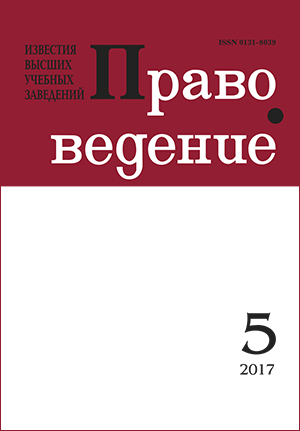Formation of legal personality of a public association in the discourse of the anthropological type of law understanding
Abstract
The article investigates the process of formation of legal personality of a public association in the discourse of the anthropological type of law understanding when a person is included into the model to understand the nature of the public association as a sole source of its will. Within the structure of legal personality of the public association citizens enter into a dialogue (communication) among each other, developing it in collaboration and interdependence by harmonizing private wills into the common will. These dialogical relationships develop further into communication between the public association and legal formations of the same order (legal entities that by law are not treated as public associations) and the state acting in relation to it as a metasystem. The initial moment of creation of the public association is connected with the awareness of a person of his/her needs to communicate (engage in a dialogue) with other persons in order to pursue common goals that are transformed into a goal-setting of the public association. The goal-setting includes not only setting a goal on the basis of individuals’ non-financial needs, but also legal tools that contribute to its achievement which include property if the public association has entered into economic turnover. Having become the source of the public association’s ability to express will, the individuals acquire a new legal status which forms the rules of law and the provisions of the charter of the public association. They establish its goal-setting and legal personality, their formation, change and realization in the legal reality, as well as define the means of identification and the specific character of target interconnectedness of willful elements of the public association as a systemic unity formed in its specific legal form. The transition of individuals into a new form of their collective existence (establishment of the public association) may be fixed by an act of the public authority reflecting the moment of establishing the long-lasting connection between the public association being a legal entity and the state in the form of control.
Keywords:
public association, anthropological type of law understanding, goal-setting, legal existence of a person, systemic unity of the public association, legal status, state registration
Downloads
References
Downloads
Published
How to Cite
Issue
Section
License
Articles of "Pravovedenie" are open access distributed under the terms of the License Agreement with Saint Petersburg State University, which permits to the authors unrestricted distribution and self-archiving free of charge.




